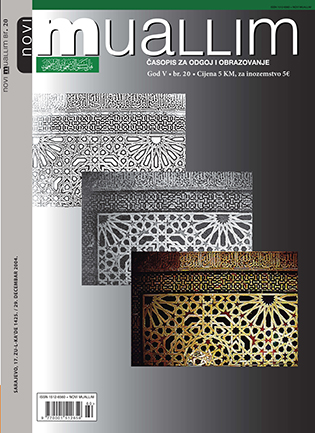HASAN KAFIJA PRUSCAK PRUSAC, 1544 – 1615
DOI:
https://doi.org/10.26340/muallim.v5i20.1218Abstract
Hasan Kafija Pruscak (1544 – 1615) was born in Prusac (Biograd), near Donji Vakuf. After attending school in Prusac, Sarajevo and Istanbul, he worked as naib (deputy) of Bali-bay who was the first mullah in Bosnia who helped the prosecution of the Hamzevi sufi order members in Posavina. He was the first kadi (judge) in the Prusac kadiluk (judicial district). Apart from serving as kadi, he also wrote his works and lectured the students. He fought in the battles of Egra (1596) and Ostrogon (1605) as a member of the Grand Vizier Lala Mehmed Pasha Sokolovic headquarters. He wrote in Arabic and Turkish. We know about seventeen of his works in philology, law, logics, stylistics and politics. His most famous work is Usul al-hikam fi nizam al alam (The fundamentals of the wisdom on the ordering of the world). He wrote it in Arabic and translated it into Turkish so that sultan Mehmed III could use it. This moral and political discourse regarding society and state organization was translated into French, German and Hungarian. Hajji Mehmed efendi Handzic translated it into Bosnian in 1935. Hasan Kafija spent most of his life in his birth city of Prusac. He transformed it into the learning and cultural center. In it, he built a mosque, mekteb (primary school), han (the inn), hamam (bath), fountain and a madrassah (secondary school), which also housed his courtroom. He also rebuilt the Ajvaz Dede water-pipeline and the mosque of the sultan Bayazit II, up on the Prusac old city. Kafija’s students continued their teacher’s work, and some of them went on to become the famous poets, kadi, historians and mufti.
Downloads
Published
How to Cite
Issue
Section
License
Naknada:
a. Časopis ne naplaćuje naknadu za obradu članaka (APC) i naknadu za podnošenje članaka.
Autori koji objavljuju u ovom časopisu pristaju na sljedeće uvijete:
- Autori zadržavaju autorska prava i pružaju časopisu pravo prvog objavljivanja, pri čemu će rad jednu godinu po objavljivanju biti podložan licenci Creative Commons imenovanje koja omogućuje drugima da dijele rad uz uvijet navođenja autorstva i izvornog objavljivanja u ovom časopisu.
- Autori mogu izraditi zasebne, ugovorne aranžmane za ne-ekskluzivnu distribuciju rada objavljenog u časopisu (npr. postavljanje u institucionalni repozitorij ili objavljivanje u knjizi), uz navođenje da je rad izvorno objavljen u ovom časopisu.


